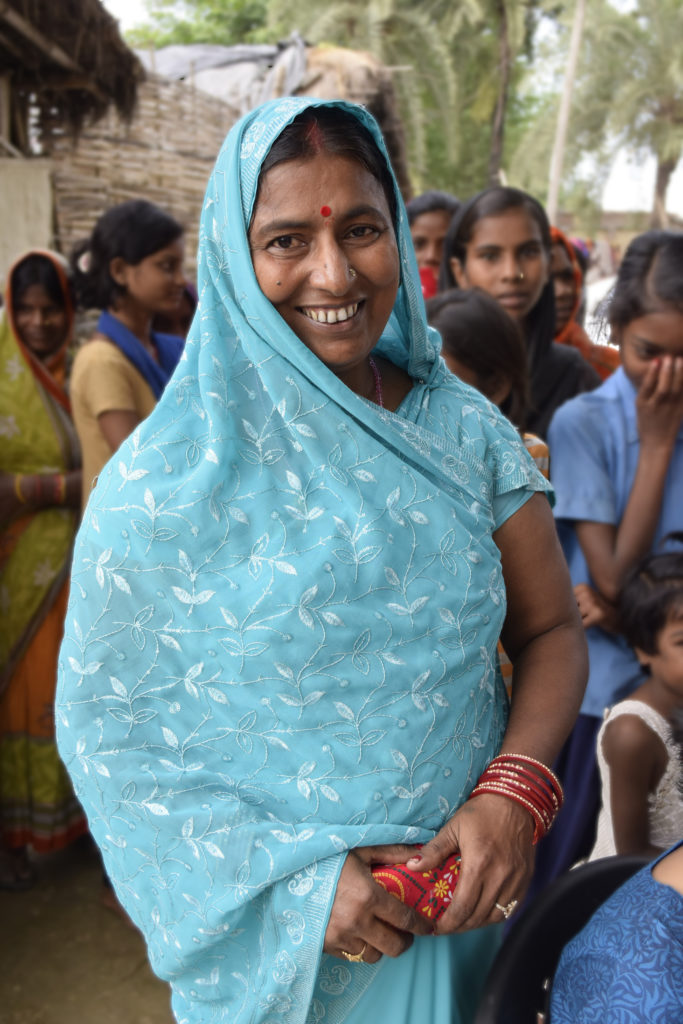Seema Devi se casó siendo adolescente. A esa temprana edad, se mudó al pueblo de su nuevo esposo, lejos de su familia.
Una de las mayores diferencias en su nueva aldea en el distrito de Sheohar, en el norte de India, era que ya no tenía retrete en su casa.
Crecer con un retrete era algo que Seema daba por sentado y nunca lo había reconsiderado. En su nuevo hogar, Seema tenía que salir y defecar al aire libre como el resto de sus vecinos.

Cuando Seema quedó embarazada de su primer hijo, salió a hacer sus necesidades en mitad de la noche. Al no poder ver en la oscuridad, tropezó y se cayó. Esa noche fue una llamada de atención para Seema. Aunque ella y su bebé resultaron ilesos, tomó la decisión de finalmente conseguir un retrete para su casa.
Esto no resultó ser tarea fácil. "Mis reiteradas exigencias no lograron convencer a mi esposo de que construyera un baño en casa", relata Seema. Tomando las riendas del asunto, Seema consiguió trabajo en una organización local de empoderamiento femenino. "Lo primero que hice con el dinero que gané fue construir un baño en casa", dice con orgullo.
La insistencia de Seema en que se construyera un baño la convirtió en una minoría en su comunidad. Esta aldea, con más de 700 familias, contaba con menos de 100 baños.
Pronto, Seema descubrió que no era la única interesada en mejorar la salud de su comunidad.
Un día, asistió a una obra de teatro organizada por Water For People. Mediante mensajes compartidos a través de obras de teatro callejeras y reuniones grupales, Water For People intentaba educar a la comunidad sobre los peligros de la defecación al aire libre y la importancia de un saneamiento seguro. Esto también incluía compartir información y recursos en cuanto a la construcción de retretes, como por ejemplo, cómo encontrar albañiles confiables y cómo calcular los costos.
Estos mensajes sobre saneamiento seguro se han estado difundiendo por toda India desde que el Primer Ministro Modi lanzó una campaña nacional de cinco años llamada la Misión Swach Bharat (India) para promover la limpieza y la higiene y eliminar la defecación al aire libre.
Seema disfrutó de estas oportunidades de aprendizaje y estaba ansiosa por participar más. Se convirtió en parte del programa local de educación sobre saneamiento como motivadora, alguien que alentaba a sus vecinos en la aldea a construir retretes.
"Acepté esta responsabilidad principalmente porque mi pueblo es conocido por su retraso en materia de saneamiento y quería cambiar esa percepción", explica. "Además, creo que si mantengo mi casa limpia, pero mis vecinos no, eso seguiría afectando la salud de mi familia. Quiero que mis vecinos también mantengan un saneamiento adecuado".
Aprovechando todo lo aprendido en Water For People, Seema ahora va de puerta en puerta hablando de baños y hablando con multitudes en eventos. Comparte su propia experiencia y su pasión por una comunidad saludable. "Hay personas que se resisten y no quieren construir un baño; les digo que al construir uno en casa benefician a sus familias, especialmente a las mujeres y los niños".

La determinación de Seema está dando frutos. Más allá de su patio, hacia las casas de sus vecinos, se ven docenas de baños en diferentes etapas de construcción. Al mejorar la salud y la seguridad de la comunidad, Seema sabe que los baños lo cambian todo.
Al apoyar a Water For People, estás empoderando a mujeres como Seema para que sigan mejorando la salud y la seguridad de sus comunidades a través de prácticas de saneamiento saludables.
Puedes conocer a más personas como Seema que están impulsando el cambio en sus comunidades. Para un mayor impacto en tu bandeja de entrada, Suscríbete a nuestros correos electrónicos.
